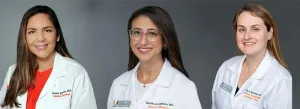(Press-News.org) A team of investigators from UCLA has identified distinct patient preference-based profiles among men diagnosed with low-risk prostate cancer regarding their treatment options that could help enhance shared decision-making and patient satisfaction in prostate cancer care.
The study, published in Urology Practice, reveals that while there were clear differences in treatment preferences among the profiles, these preference profiles did not significantly influence the patients' final treatment choices.
“Men diagnosed with prostate cancer face a variety of treatment options that can have significant long-term effects on their life, making it vital for physicians to better support patients in making informed decisions about their treatment options,” said Dr. Christopher Saigal, professor and executive vice chair of urology at the David Geffen School of Medicine at UCLA and first author of the study. “By identifying and understanding the different preference phenotypes among prostate cancer patients, we can help patients choose the most appropriate treatment based on their personal preferences and circumstances.”
To better understand the different priorities and concerns that influence patient choices, the team collected data from a cohort of 250 men diagnosed with low-risk prostate cancer. These patients used decision aid software developed at UCLA that applied a statistical technique used in market research known as conjoint analysis to assess their preferences for various treatment outcomes. The software measured how much they valued factors such as recovery time, quality of life and survival.
This approach is similar to market segmentation in business, where understanding customer preferences leads to better products and customer satisfaction.
By analyzing these preferences using the Latent Class Analysis method, the researchers identified three distinct preference-based profiles, termed phenotypes, among the group of patients:
Class 1: Men who were highly concerned about recovery time and less concerned about improving lifespan.
Class 2: Men with evenly balanced concerns among priorities across different treatment outcomes.
Class 3: Men who showed the lowest concerns around recovery times and surgical complications, focusing more on longevity and avoiding complications from radiation therapy.
Despite the differences among phenotypes, the researchers found that these preference profiles did not significantly influence patients' final treatment choices. Instead, the physician's recommendation played the most crucial role in determining the treatment.
While it is possible that physicians took into account patient preferences when making recommendations in the shared decision-making process that could not be measured with the decision aid software, it was still surprising to the team that preferences for the measured attributes that are relevant for this decision were not associated with treatment choice, noted Saigal.
“Understanding decision-making from the patient perspective will help us partner with patients to make the decision that is right for them,” said Dr. Jonathan Bergman, clinical assistant professor of urology at the David Geffen School of Medicine at UCLA and senior author of the study. “This highlights a need for physicians to better integrate patient preferences into their treatment recommendations.”
Despite this disconnect, the team found patient satisfaction with their care remained high. Decision quality metrics, including low decisional conflict and high satisfaction scores, indicate that patients felt their voices were heard and respected during the consultation process.
The study opens the door for further research into how physicians can better integrate patient preferences data into treatment guidelines and recommendations to better provide more personalized patient care.
“We hope these findings provide insights that can enhance the decision-making process, improve patient-provider communication, and ultimately lead to better health outcomes and patient satisfaction,” said Saigal. “It is also possible that data such as these can be used to improve the patient-centeredness of national guidelines for prostate cancer treatment.”
Both Saigal and Bergman are members of the UCLA Health Jonsson Comprehensive Cancer Center.
The study’s other authors are Brett Hollenbeck, Kristin Williams, Lorna Kwan, Josemanuel Saucedo, all from UCLA, and Dr. David Penson from Vanderbilt University School of Medicine.
Disclosures: Saigal is a board member of WiserCare, the company that produced the software used in this study to measure patient preferences.
END
Study identifies unique treatment preference profiles in men with prostate cancer
Findings holds promise for more personalized and effective prostate cancer care
2024-07-25
ELSE PRESS RELEASES FROM THIS DATE:
Parched Central Valley farms depend on Sierras for groundwater
2024-07-25
New research shows that California’s Central Valley, known as America’s breadbasket, gets as much as half of its groundwater from the Sierra Nevadas. This is significant for a farming region that, in some parts, relies almost entirely on groundwater for irrigation.
While it is easy to see above-ground reservoirs rise and fall with the rain and snow, aquifers are a natural water source hidden out of sight, in some cases hundreds of feet underground. “They are like giant bathtubs full of water and sediment,” said UC Riverside associate professor of groundwater hydrology Hoori Ajami.
Scientists have ...
NYUAD researcher receives National Science Foundation grant to study the role of tiny diatoms in protecting endangered marine animals
2024-07-25
Abu Dhabi, UAE, July 25, 2024: NYU Abu Dhabi (NYUAD) Associate Professor of Biology Shady Amin has received a grant of more than USD 500,000 from the National Science Foundation (NSF). He will lead a project that is aimed at elevating the understanding and awareness of the essential role played by diatoms, the tiny microalgae that can live in oceans or in symbiosis with endangered marine animal hosts like whales, dolphins, dugongs, and manatees and play a fundamental role in maintaining Earth’s delicate ecosystem.
Diatoms are microalgae ...
Three junior faculty members join Sylvester Comprehensive Cancer Center’s K12 Faculty Scholars at Annual Symposium
2024-07-25
MIAMI, FLORIDA (July 25, 2024) – Three junior faculty members at Sylvester Comprehensive Cancer Center, part of the University of Miami Miller School of Medicine, have been named K12 2024 Faculty Scholars. They bring to 16 the number of junior faculty who have joined Sylvester’s prestigious K12 Calabresi Clinical Oncology Research Career Development Program since its inception in 2018. The program awards recipients with resources to pursue independent research careers in clinical and translational cancer research.
The K12 2024 Faculty Scholars ...
Climate change will bring more turbulence to flights in the Northern Hemisphere
2024-07-25
American Geophysical Union
25 July 2024
AGU Release No. 24-28
For Immediate Release
This press release is available online at: https://news.agu.org/press-release/climate-change-will-bring-more-turbulence-to-flights-in-the-northern-hemisphere/
Climate change will bring more turbulence to flights in the Northern Hemisphere
Disruptive clear air turbulence is predicted to increase over most northern mid-latitude regions
AGU press contact:
Liza Lester, +1 (202) 777-7494, news@agu.org (UTC-5 hours)
Contact information for the researchers:
Mohamed ...
Dr. Amy Acton, LeVar Burton, Macalester College President Suzanne Rivera named panelists for Inamori Ethics Prize symposium on moral imperatives in public health
2024-07-25
CLEVELAND—In our increasingly interconnected world, the ongoing risk of communicable health conditions to human life demands organized and equitable public health efforts to combat known and emerging local and global health threats.
But how best to tackle such critical needs and balance individual autonomy with preventing public harm? How should we care for those who take care of us? How can we advance research and regain the trust of historically marginalized groups? What role should the United States play in the world’s healthcare plans?
These and other issues will be discussed this fall at Case Western Reserve University’s ...
SNIS 2024: Medicare continues to undervalue lifesaving stroke surgery
2024-07-25
FOR IMMEDIATE RELEASE: July 25, 12:10 P.M. MDT
CONTACT: Camille Jewell
cjewell@vancomm.com or 202-248-5460
COLORADO SPRINGS, Colo. — Despite thrombectomy’s high success rate in saving the lives of stroke patients, Medicare is paying lower rates over time for the procedure, according to research presented today at the Society of NeuroInterventional Surgery’s (SNIS) 21st Annual Meeting.
Three studies, “The Price of Progress — Evaluating Medicare’s Valuation of Stroke Treatment,” “Fiscal Clots in the Stream of Stroke Care: The Mechanical Thrombectomy Reimbursement Dilemma,” ...
Exploring the dynamics of combatting market-driven epidemics
2024-07-25
A case definition of market-driven epidemics (MDEs) could help address critical barriers to timely, effective prevention and mitigation, according to a study published this week in the open-access journal PLOS Global Public Health by Jonathan Quick from Duke University School of Medicine, U.S., and colleagues.
The misuse and overconsumption of certain consumer products have become major global risk factors for premature deaths at all ages, with their total costs in trillions of dollars. Progress in reducing such deaths has been difficult, slow, and too often unsuccessful. To address this challenge, ...
How iBuyers are changing real estate racial disparities and individual homeownership rates in one major city
2024-07-25
Instant buyers, also known as iBuyers, rapidly buy and sell homes using automated models to set prices. These companies, such as Opendoor and Offerpad, can turn around cash offers in a matter of hours, and they’ve captured more than 5% of the real estate market in some U.S. cities.
Since new tech often replicates or exacerbates existing societal biases, University of Washington researchers wanted to investigate how iBuyers have affected the well-documented racial bias in home appraisals — particularly bias against Black homeowners.
The ...
Array pinpoints imprinted genes with potential links to disease
2024-07-25
Researchers from North Carolina State University have developed an array that assesses methylation levels of genes located in imprint control regions (ICRs) within the human genome. The array represents a cost-effective, efficient method for exploring potential links between environmental exposures and epigenetic dysregulation during the early developmental origins of diseases and behavioral disorders.
ICRs regulate the expression of imprinted genes – genes where only one parental copy of the gene is active, while the other copy is silenced early in development. Imprinted genes are of special interest to epidemiologists, geneticists, and toxicologists who study the connections ...
Posterior surgery is noninferior to anterior surgery for cervical radiculopathy
2024-07-25
July 25, 2024 — For patients with cervical radiculopathy, posterior foraminotomy provides outcomes comparable to those of the more commonly performed anterior cervical discectomy, reports a randomized clinical trial in The Journal of Bone & Joint Surgery. The journal is published in the Lippincott portfolio by Wolters Kluwer.
"[O]ur findings provide Level-I evidence that posterior surgery is noninferior to anterior surgery with regard to the clinical outcome, with follow-up of two years," according to the new research by Nádia F. Simões de Souza, MD, and Anne E. H. Broekema, MD, ...
LAST 30 PRESS RELEASES:
Research alert: Understanding substance use across the full spectrum of sexual identity
Pekingese, Shih Tzu and Staffordshire Bull Terrier among twelve dog breeds at risk of serious breathing condition
Selected dog breeds with most breathing trouble identified in new study
Interplay of class and gender may influence social judgments differently between cultures
Pollen counts can be predicted by machine learning models using meteorological data with more than 80% accuracy even a week ahead, for both grass and birch tree pollen, which could be key in effective
Rewriting our understanding of early hominin dispersal to Eurasia
Rising simultaneous wildfire risk compromises international firefighting efforts
Honey bee "dance floors" can be accurately located with a new method, mapping where in the hive forager bees perform waggle dances to signal the location of pollen and nectar for their nestmates
Exercise and nutritional drinks can reduce the need for care in dementia
Michelson Medical Research Foundation awards $750,000 to rising immunology leaders
SfN announces Early Career Policy Ambassadors Class of 2026
Spiritual practices strongly associated with reduced risk for hazardous alcohol and drug use
Novel vaccine protects against C. diff disease and recurrence
An “electrical” circadian clock balances growth between shoots and roots
Largest study of rare skin cancer in Mexican patients shows its more complex than previously thought
Colonists dredged away Sydney’s natural oyster reefs. Now science knows how best to restore them.
Joint and independent associations of gestational diabetes and depression with childhood obesity
Spirituality and harmful or hazardous alcohol and other drug use
New plastic material could solve energy storage challenge, researchers report
Mapping protein production in brain cells yields new insights for brain disease
Exposing a hidden anchor for HIV replication
Can Europe be climate-neutral by 2050? New monitor tracks the pace of the energy transition
Major heart attack study reveals ‘survival paradox’: Frail men at higher risk of death than women despite better treatment
Medicare patients get different stroke care depending on plan, analysis reveals
Polyploidy-induced senescence may drive aging, tissue repair, and cancer risk
Study shows that treating patients with lifestyle medicine may help reduce clinician burnout
Experimental and numerical framework for acoustic streaming prediction in mid-air phased arrays
Ancestral motif enables broad DNA binding by NIN, a master regulator of rhizobial symbiosis
Macrophage immune cells need constant reminders to retain memories of prior infections
Ultra-endurance running may accelerate aging and breakdown of red blood cells
[Press-News.org] Study identifies unique treatment preference profiles in men with prostate cancerFindings holds promise for more personalized and effective prostate cancer care




